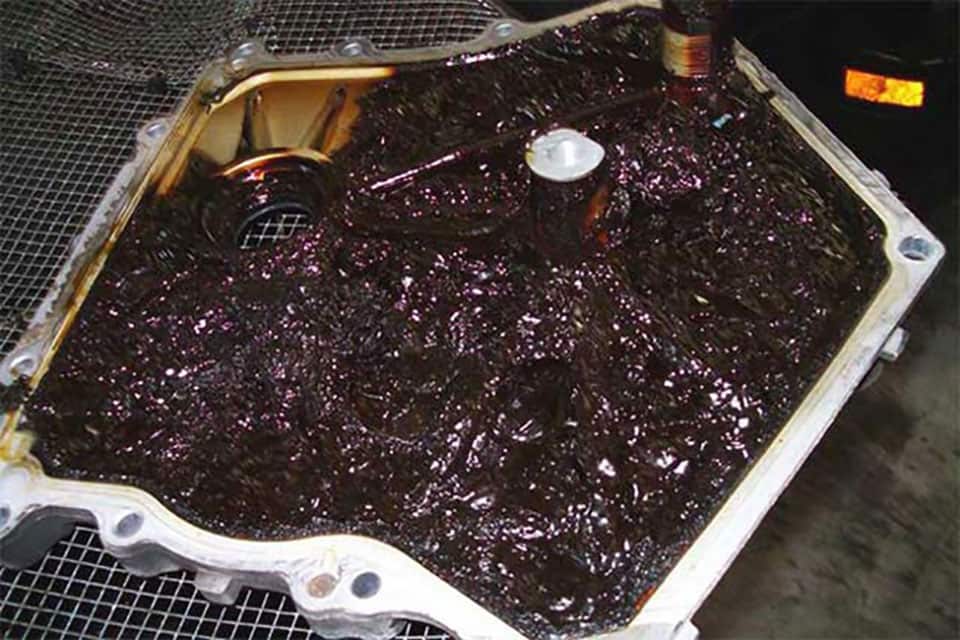Oil Sludge in the 1.8L Turbocharged Engine
- Audi's 1.8L turbocharged engine is developing oil sludge that causes excess friction and wear on the engine.
- The sludge is believed to be the result of the engine's excess heat combined with its 3.7-quart oil capacity.
- As part of a settlement, Audi owners have been offered extended warranties but with multiple provisions.

Sludge is the thickening of engine oil. It's caused by moisture, heat, and other contaminants that break the oil down, causing it to gel and reducing its flow and lubrication qualities.
Sludge in Audi's 1.8L Turbocharged Engine ∞
Certain 1997-2005 Audis have a 1.8-liter turbocharged engine with a tiny 3.7-quart oil capacity.
The turbochargers in these engines are hot and, according to some mechanics, there is simply not enough oil to properly dissipate the heat. The small oil capacity also removes any margin for error on oil changes, owners better not be late or they'll pay the price.
Volkswagen did install "oil coolers" in some of these Audis, but owners say they didn't do much other than leak.
An Extended Warranty ∞
In 2004, VW extended the warranty on some cars to 8 years and unlimited mileage. They also offered to help compensate owners who've had oil problems and already paid for repairs. In order to be eligible for that help, however, you had to provide documentation showing "adequate maintenance records".
Unfortunately, Audi has a different definition of "adequate." Owners who threw out one oil receipt, missed an oil change by a few miles, or decided to save a few bucks and change their own oil were all known to have their claims denied.
The situation was bad. Even Len Hunt, who was the vice president of VW at the time, said he thought the requirements for consumers to get reimbursed were too strict.
When you’ve got a reputation for not such stellar quality, you’ve to treat the customer properly. Sometimes your rules and regulations and the culture of the company can be a little bit harsh when it gets translated down to the customer level,
he said. We’ve got to have some latitude in there.
Class-Action Settlement ∞
VW and Audi were sued multiple times for their strict requirements, their unwillingness to help owners, and accused of committing fraud.
VW eventually eased the restrictions on sludge claims and reached a settlement agreement on their lawsuits. They denied any wrongdoing in the process.
Settlement Provisions ∞
- Owners will be compensated 100% of the repair costs if they can prove they performed the last two oil changes within the recommended specs before any oil sludge or engine failure started. There is a 20% "permissible variance" on those time and mileage limits.
- Owners will receive 50% of the repair costs if they cannot provide proof that the last two oil changes were made within the recommended specs before the oil sludge or engine failure happened.
There is additional information about Audi and Volkswagen oil sludge problems on VWProblems.com.
Generations Where This Problem Has Been Reported
This problem has popped up in the following Audi generations.
Most years within a generation share the same parts and manufacturing process. You can also expect them to share the same problems. So while it may not be a problem in every year yet, it's worth looking out for.
2nd Generation A4
- Years
- 2001–2004
- Reliability
- 38th out of 39
- PainRank™
- 7.69
- Complaints
- 38
Further Reading
A timeline of stories related to this problem. We try to boil these stories down to the most important bits so you can quickly see where things stand. Interested in getting these stories in an email? Signup for free email alerts for your vehicle over at CarComplaints.com.
The Volkswagen Group, parent company of Audi, has reached a settlement on a class-action lawsuit claiming 500,000 of their vehicles were prone to engine damage from oil sludge.
The Audi vehicles involved in the settlement are the 1997-2004 A4, including the sedan, wagon, and convertible body styles.
keep reading article "Audi Settles Class Action Engine Sludge Lawsuit"